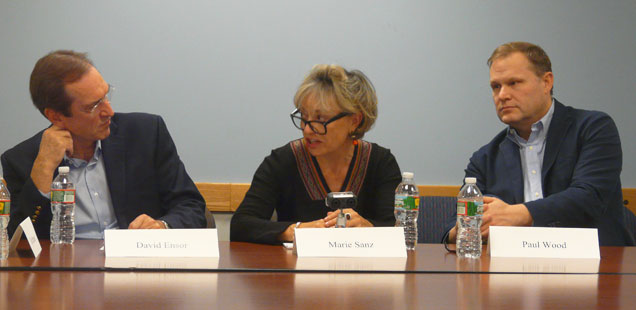November 17, 2015 — The Shorenstein Center closed its fall semester event series with a conversation with the fall 2015 Joan Shorenstein Fellows: David Ensor, former director of Voice of America, Marie Sanz, Lima, Peru bureau chief, AFP, and Paul Wood, foreign correspondent, BBC. The panel discussion focused on the November 13 terrorist attacks in Paris, as well the fellows’ work at the Center.
Ensor called for an increase in the use of soft power in the fight against terrorism, particularly through media outlets such as Voice of America (VOA). “Hard power alone will not resolve our problems,” he said. Ensor provided examples of communications efforts that he said are underfunded, but could be powerful tools to fight terrorism: a State Department effort that monitors chatrooms to dissuade Westerners from joining ISIS, and an effort to connect mullahs and imams with Islamic clerics to reaffirm Islam as a peaceful religion.
Journalism should be another form of soft power, used to engage global populations, said Ensor. “The best answer to propaganda is not more propaganda, it’s truth,” he said. Despite budget cuts and attempts to turn it into a propaganda operation, VOA has retained independence, partnered with local stations, moved into the digital age through the use of apps, and has grown its audience, including in Muslim countries, said Ensor.
Sanz, who is from Paris, has been researching the normalization of relations between the U.S. and Cuba, which she said “represents an acceptance, finally, that the old policies of the last 50 years did not work.” Sanz drew parallels between U.S.-Cuba relations and those between the U.S. and the Middle East. “The violence and horror of what happened in Paris is also perhaps a signal to think differently…talks of massive violence only give rise to more massive violence.” Instead, said Sanz, policymakers and the media need to address underlying problems such as alienation and racism that are causing European-born Muslims to see ISIS as a good option.
Wood discussed some of the common narratives about ISIS he has seen in the media recently. He listed six ideas that he considered fallacies:
- This is a clash of civilizations. It is not, said Wood, as there are 1.5 billion Muslims in the world, and most peacefully co-exist with their neighbors.
- This is an existential struggle. No it isn’t. ISIS launches terrorist attacks because it is not powerful enough to do anything else.
- ISIS is not Islamic. Yes it is, albeit a perverted view of Islam.
- Assad was right all along. No, the Assad regime has a long history of working with and manipulating Islamist fanatics.
- It’s Obama’s fault for leaving Iraq. It is not, as the Islamic State’s forerunner in Iraq had been defeated by the time U.S. troops left Iraq.
- We can bomb them back to the Stone Age. Bombing is ineffective and counterproductive – the better option is to get ISIS fighters to change sides, said Wood.
During the question and answer session, the fellows discussed recent opposition to accepting Syrian refugees in Europe and in the United States. Wood described it as “deeply unfair,” as a bigger security threat comes not from the refugees, but from Europeans traveling to Syria to join ISIS, who then return to Europe.
Wood and Sanz also discussed what Wood called a “crisis” among Muslim youth, particularly in Europe. Wood said he had encountered two kinds of youth who join ISIS: “gangsters,” who are not very religious, who join ISIS after having been involved in other crimes, and “true believers,” who are religious and full of anger against the West. Sanz remarked that even for second and third generation Muslims in France, there is “a stigma if your name is Mohammed.”
Regarding how the West should move forward, Wood said, “Our biggest failure is…failing to empathize with our enemies. You speak to these young Jihadis, they hate the BBC. It’s the enemy broadcaster. You have to get people of their age, their class, their outlook to speak to them in their language, on their outlets.”
The fellows also discussed VOA’s programming in contrast to other state-run media, how to encourage policymakers to prioritize soft power, Russia’s involvement in Syria, the normalization of U.S.-Cuba relations, and more. Listen to the full audio recording above.
Article and photo by Nilagia McCoy of the Shorenstein Center.


